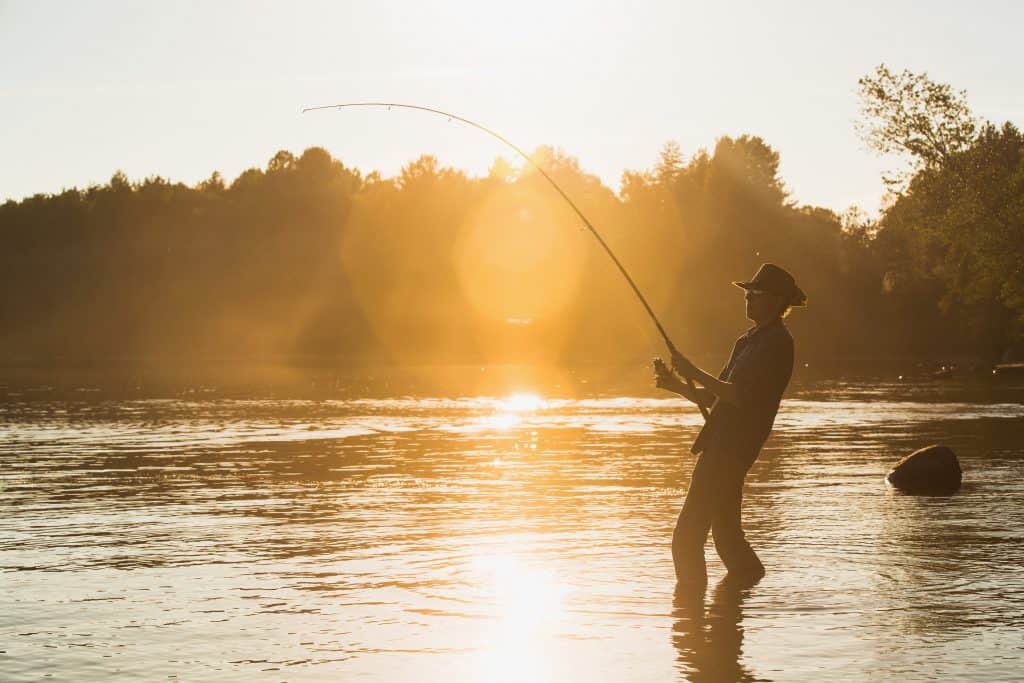
While preparing for my next fishing trip, I needed to purchase a fishing license. I then became curious about the price of fishing licenses by state. I did some research on the cost in Texas and here is what I found.
So, how much does a Texas fishing license actually cost? Like many other states, Texas has varying prices for each of the many different kinds of licenses offered there including for fishing. However, a Texas fishing license is relatively cheap in comparison to other states. On average it costs $30 to $40.
The many different types of licenses and validations allow for states to keep a closer eye on the fishing taking place throughout the state, and enforce more of the rules and regulations more efficiently.
If you want to more about the cost of each license, where to find your fishing license, and the regulations when fishing in Texas continue reading on below.
How Much Does a Texas Fishing License Cost?
| Endorsements | Cost |
| Saltwater Fishing Endorsement | $10.00 |
| Freshwater Fishing Endorsement | $5.00 |
| Temporary Fishing Licenses | Cost |
| Resident One Day All Water Fishing | $11.00 |
| Non-Resident One Day All Water Fishing | $16.00 |
| Fishing Packages | Cost |
| Resident Freshwater Fishing Package | $30.00 |
| Resident Saltwater Fishing Package | $35.00 |
| Resident All Water Fishing Package | $40.00 |
| Resident Year-From-Purchase All Water Package | $47.00 |
| Senior Resident Freshwater Fishing Package | $12.00 |
| Senior Resident Saltwater Fishing Package | $17.00 |
| Senior Resident All Water Fishing Package | $22.00 |
| Special Resident All Water Fishing (D | $7.00 |
| Non-resident Freshwater Fishing Package | $58.00 |
| Non-resident Saltwater Fishing Package | $63.00 |
| Non-resident All Water Fishing Package | $68.00 |
The state of Texas also offers fishing licenses that apply only to certain bodies of water. For example, if you want to spend a day fishing exclusively on Lake Texoma, it would cost you twelve dollars to purchase a day pass there.
Like many states, there are military discounts available for fishing licenses. If you are an active duty military member or a disabled veteran than your fishing licenses are available to purchase with no charge.
Similar to other states, Texas offers a lifetime license option.
However, the Texas lifetime licenses do not change in price with as some other states do and are a little more expensive.
| License Package | Cost |
| Lifetime Resident Combination Hunting and Fishing | $1,800 |
| Lifetime Resident Fishing | $1,000 |
| Upgrade from Lifetime Resident Hunting to Combination Hunting and Fishing | $800 |
| Upgrade from Lifetime Resident Fishing to Combination Hunting and Fishing | $800 |
If you know you will be going fishing, hunting, or both each year, save yourself some money in the long run and opt for one of the lifetime packages instead of a daily or annual pass.
For those who are both avid fishermen and hunters, Texas offers a unique combo package to lower your overall costs to participate in both activities.
The Resident Combo Hunting and Fishing Packages range from $50 to $60
Licenses are valid from the day of purchase until August 31st, unless otherwise stated.
Content Credit: tpwd.texas.gov
Where You Can Buy a Texas Fishing License?

Like most states nowadays, fishing licenses have been made available for purchase online, which is very convenient.
To find your fishing license visit the Texas Parks and Wildlife website.
However, some licenses such as senior fishing licenses or disability fishing licenses are not available online and can be purchased either by phone or from a retailer who is authorized to sell them.
For licenses sold over the phone, there is a $5 administrative fee.
Texas fishing licenses are available for purchase online, by the phone, or at a license retailer.
To find an authorized retailer near you, check out this website to see the retailer located closest to you!
Texas Fishing Regulations
There are many laws, rules, and regulations that come into play when going fishing. That’s right, purchasing a fishing license,
While there are different rules and regulations pertaining to either saltwater fishing or freshwater fishing, there is a set of general fishing standards and regulations for both settings.
General Fishing Regulations
Fishing in any type of water, whether it be salt or fresh, require you to hold a valid fishing license.
If you are looking for turtles or frogs, this will require a hunting license,
Be sure to look at the list below of the fish that are legal to be caught and which are not. There can be hefty fees or even jail time for interfering with some of the restricted species.
In the event that you do come across one of the restricted species, contact local authorities to avoid causing any more injury or trauma to the creature.
Contact local authorities immediately if you accidentally catch or injure a restricted species.
While some states limit the number of poles to one while fishing, Texas permits the use of multiple poles, except in certain situations.
All game fish are permitted to be caught by pole and line (rod and reel) unless otherwise noted. Hand operated devices used to catch fish that are held underwater are NOT permitted for the use of catching game fish.
Cast nets are only to be used for the use of catching non-game fish.
In California, the law states that no more than 3 hooks in allowed on a line. However, Texas’ laws and regulations state that no more than 100 hooks may be used on all of your combined devices when in freshwater.
If you have any other questions or concerns about the rules and regulations of fishing in Texas, be sure to check out the online handbook at: https://tpwd.texas.gov/regulations/outdoor-annual/fishing/general-rules-regulations/
How Long Is a Texas Fishing License Good For?
Depending on which license you purchase, the date it expires could change. Typically, your license will expire on August 31st, regardless of when you buy it. This is true for the license year packages available.
One package, in particular, differs in when it expires. This would be the Year-From-Purchase All Water Package that is available to Texas residents only. This license expires at the end of the month (of when you purchased it) of the following year. If you bought it on October 5, 2023, it would expire on October 31, 2024.
Do Children Need a Fishing License in Texas?
Every state has different rules about requiring children to have a license to fish. In the state of Texas, children under the age of seventeen are not required to hold a fishing license. Once they turn seventeen, a valid Texas fishing license must be obtained.
If your child is ages 1 through 16, you may need to purchase tags or stamps for them to fish in various bodies of water, but not a license. Check with the local regulations for any limits on catch or size.
There is one exemption to this. If you have an older child over the age of seventeen with a mental disability and as a part of an approved therapy, fishing without a license is permitted in the state of Texas.
To read more about obtaining a fishing license for kids, click here!
What is the Fine for Fishing Without a Texas Fishing License?
There are possible consequences if you forget or decide to take your chances and fish without first obtaining a license. For most fishing offenses in Texas, penalties typically involve citations with fines under $500.
In some cases, you might even face multiple citations and fines stemming from a single incident. However, the most substantial financial consequences arise when you’re compelled to compensate the state for the value of each harmed or deceased animal, potentially leading to costs in the thousands of dollars.
If you find yourself in the unfortunate situation of facing multiple fines, you may be able to present your case before a judge. But unless you have an experienced attorney specializing in these cases, it’s likely not worth your time and the court fees.
Are There Free Fishing Days When a License is Not Required?
If you want to try fishing but don’t necessarily want to spend the money on a Texas fishing license, you may wonder, “Are there free fishing days when a license is not required?”
I was pleasantly surprised to learn that one day a year, the state of Texas allows everyone to fish recreationally without endorsements or a license. This day occurs on the first Saturday in June every year.
These free fishing days are a great way to get the family out to the lake or river and try fishing, possibly for the first time. Take advantage of this day every year!
In addition to the one free fishing day, fishermen and those wanting to fish occasionally can fish without a Texas Fishing License at over seventy state parks. Keep in mind, though, there will likely be an entrance fee.
Other fishing regulations will still apply, including fish lengths and bag limitations. It’s always best to check with the specific state park beforehand to ensure you follow all regulations put in place.
Fish to Catch in Texas
In case you are wondering what fish there are available in Texas’ waters, here is a quick list for all the fish legal for catch within Texas state lines.
Game Fish
- Bass (Alabama, Guadalupe, largemouth, smallmouth, spotted, striped, white, and yellow)
- Catfish (blue, channel, flathead)
- Cobia
- Crappie (black, white)
- Mackerel (king, Spanish)
- Marlin (blue, white)
- Pickerel
- Red drum
- Sailfish
- Seatrout (spotted)
- Sharks
- Snook
- Spearfish, long bill
- Swordfish, broadbill
- Tarpon
- Tripletail
- Trout (brown, rainbow)
- Wahoo
- Walleye
Fish/Animals Restricted From Being Caught
- Sea Turtles (Green, Loggerhead, Kemp’s ridley, Leatherback, and Hawksbill)
- Any endangered or threatened fish species (paddlefish, shovel-nosed sturgeon, sawfish, and any others)
- Diamondback terrapin
- Marine Mammals (Porpoises, Dolphins, or Whales)
Related Questions:
What state has the most expensive fishing license? California is known for having the most expensive fishing licenses in the United States. California often uses higher prices on fishing licenses, validations, and report cards in order to raise revenue for projects across the state.
What age is considered “senior” for a Texas fishing license? The national standard for the age of a senior citizen is 65 years or higher. Like many restaurants or businesses, there is a discounted offered for being a senior, so be sure to look into that discount to see if you qualify!
